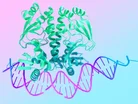Google DeepMind's AlphaFold 3 'is Drug Discovery Boost'

Google DeepMind has launched an AI model for predicting the structures and interactions of all life’s molecules, the company has announced.
The solution, called AlphaFold 3, can accurately model the shapes of proteins and DNA, and the next-generation tool is expected to help scientists unlock new discoveries in biology.
AlphaFold Server, meanwhile, is a newly available free platform for scientists worldwide to use for non-commercial research.
They platform can harness AlphaFold 3’s predictions, and test hypotheses “with just a few clicks, no matter their technical expertise”, Google DeepMind said in a post on LinkedIn.
It added: “Millions of researchers around the world have used AlphaFold predictions in areas such as developing an experimental malaria vaccine and designing plastic-eating enzymes.”
AlphaFold 3 has been developed in cooperation with Isomorphic Labs, a digital biology company seeking to redefine drug discovery using AI.
Isomorphic labs is now applying AlphaFold 3 to “design new drugs and tackle real-world therapeutic challenges”, the company says.
The details of AlphaFold 3 were made public in a paper published in Nature.
AlphaFold 3 'will transform drug discovery'
In it, Google DeepMind says it hopes AlphaFold 3 “will help transform our understanding of the biological world and drug discovery”.
It added: “Our new model builds on the foundations of AlphaFold 2, which in 2020 made a fundamental breakthrough in protein structure prediction.
“So far, millions of researchers globally have used AlphaFold 2 to make discoveries in areas including malaria vaccines, cancer treatments and enzyme design.
“AlphaFold has been cited more than 20,000 times and its scientific impact recognized through many prizes, most recently the Breakthrough Prize in Life Sciences.”
Google DeepMind adds that AlphaFold 3 “takes us beyond proteins to a broad spectrum of biomolecules”, and that this leap could unlock more transformative science, “from developing biorenewable materials and more resilient crops, to accelerating drug design and genomics research”.
About Google DeepMind
Google DeepMind was founded in 2010, and is an Anglo-American AI research laboratory that serves as a subsidiary of Google.
It is a team of scientists, engineers and machine learning experts working to advance uses of AI in science. “We use our technologies for widespread public benefit and scientific discovery, and collaborate with others on critical challenges, ensuring safety and ethics are the highest priority,” it says.
Its long-term aim is to develop more general and capable problem-solving systems, known as artificial general intelligence (AGI).
Google DeepMind says that AGI, if guided by safety and ethics, “can help society find answers to some of the world’s most pressing and fundamental scientific challenges”.
It has a track record of breakthroughs in AI research, published in noted journals including Nature and Science. Its AI programmes have:
- Learned to diagnose eye diseases as effectively as the world’s top doctors
- Saved 30% of the energy used to keep data centres cool
- Predicted the complex 3D shapes of proteins, which could one day transform how drugs are invented
